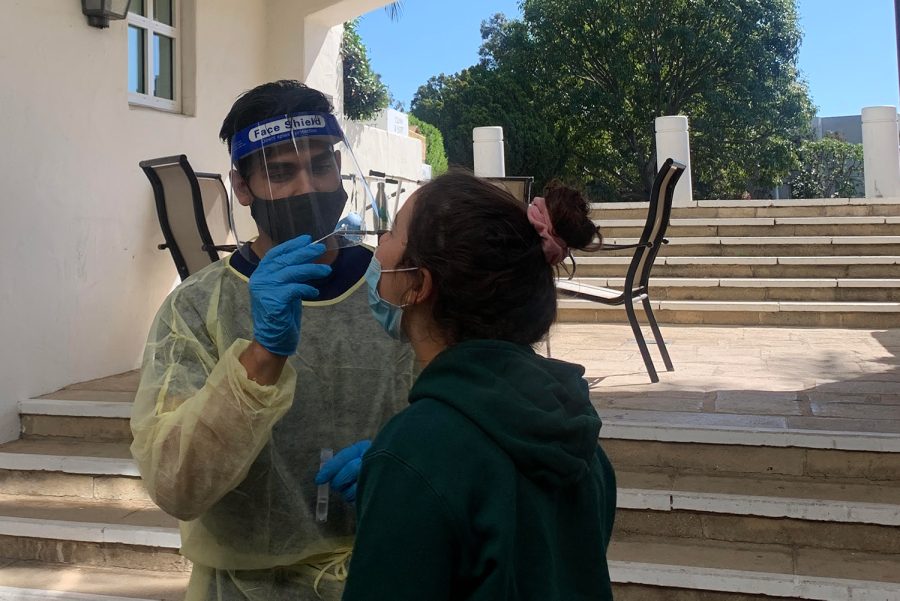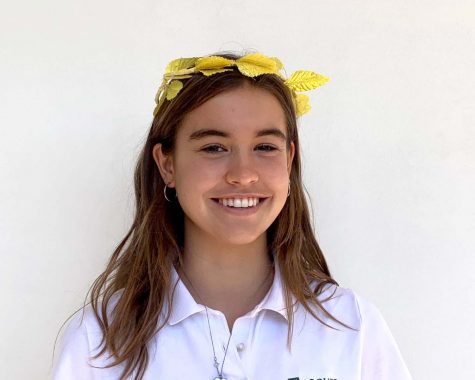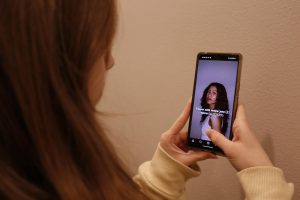Friday test results delayed as in-person learning begins, students share concerns
Photo credit: Greta Irvine
Junior Rose Sarner gets PCR tested for COVID-19 in the library courtyard. Drive through testing ensued on Friday, Jan. 7 in the back field where results were delayed until Monday, Jan. 10. In person learning occured on Monday despite the delay in results.
January 11, 2022
After a week of remote learning and to ensure a safe return to in-person learning the week of Jan. 10 to Jan. 14, students, faculty and staff were required to participate in PCR testing on Friday, Jan. 7. Test results were expected within 72 hours of the return to campus. However, Archer leaders were informed by IHD Labs that the results would be delayed until Monday, Jan. 10, when community members returned to campus.
An email from Associate Head of School for Finance and Operations Jane Davis on Sunday, Jan. 9, informed community members that school would be open for in-person learning on Monday despite the delay in testing results.
“I was happy to be back in-person. I was grateful that we could all be back,” sophomore Tess Hubbard said. “But, also, I was trying to be more cautious knowing that there could be people who had COVID.”
The delay in results was attributed to a surge in testing from the holidays that caused processing time to increase to 48-96 hours at many labs. In light of this delay, some students like junior Azel Al-Kadiri chose to attend classes virtually on Monday.
“My brother tested positive last week and so I definitely I had a new obstacle of being in close contact,” Al-Kadiri said. “I was really depending on the negative result taken on Friday, and because that was delayed I thought just to take an extra precaution, just out of respect for my classmates, I would miss the day.”
As results came in throughout the school day, those who tested positive were escorted from class to isolate, and parents were notified to pick up their child from campus. Davis noted in a later email that contract tracing would ensue the following morning. This email, sent after school on Monday, also informed community members that over half the results were yet to be received, but Archer leaders were hopeful that they would arrive that evening. Senior Isabella Specchierla shared her concerns about returning to campus without the test results.
“We should at least be online for the first two days while people get the results back and then let people come in, because now people who have had COVID have been in Archer already,” Specchierla said. “Taking them out still is contaminating whatever areas they were in and [they] could have spread it to other girls.”
Senior Gabby Wolf took extra precautions when returning the campus on Monday.
“My entire family had COVID besides me, so … I [was] a little bit nervous because not all of these COVID tests came back for people. But, what I did to take precaution was I didn’t take the bus, so I had my mom drive me to school,” Wolf said. “What I thought was a little odd was that they didn’t make that more accessible to people. I think that [on] the bus, even though we have all the windows down, we’re all still in very close quarters.”
Parents had the option to have their student remain at home until the results were received. While teachers were not holding hybrid classes, some gave students the opportunity to Zoom into class while others posted asynchronous work on Powerschool Learning Hub. For Wolf, the lack of hybrid learning pushed her to attend in-person learning.
“I wanted to come to school because a lot of teachers are not offering online alternatives, and so, I didn’t want to miss that in-person learning time,” Wolf said. “It’s kind of like during finals before COVID happened where everyone came to finals when they were super, super sick because there was not [an] easy way to make up the final. So if there’s no alternative it’s easier to come to school.”
In her first email, Davis addressed the communities response to the delayed testing and referenced hopeful sources on the COVID-19 spike.
“We appreciate your patience as we navigate this surge,” Davis wrote. “Most experts believe [it] will peak in January and quickly subside.”









